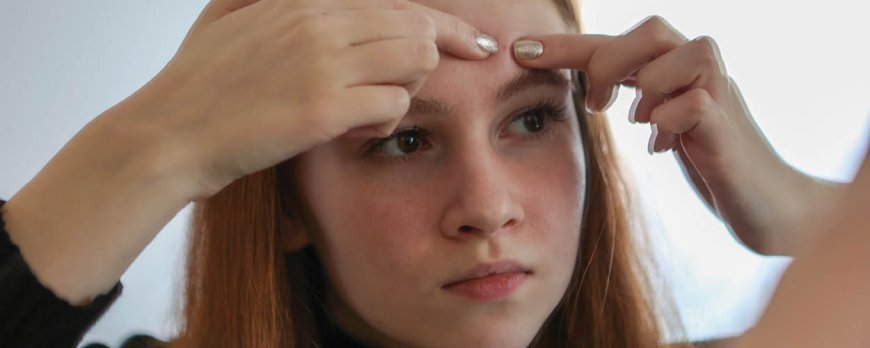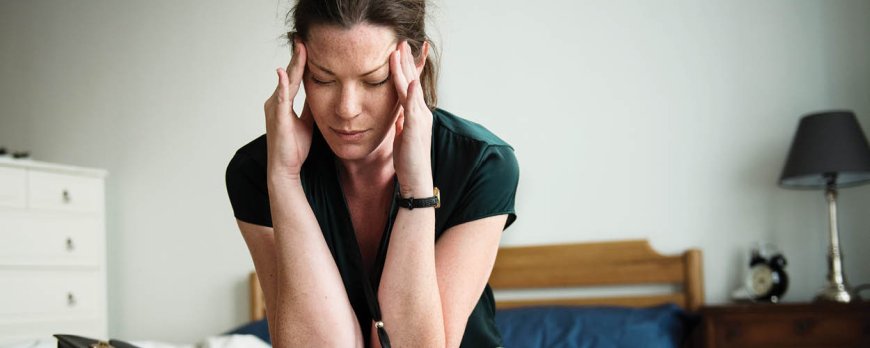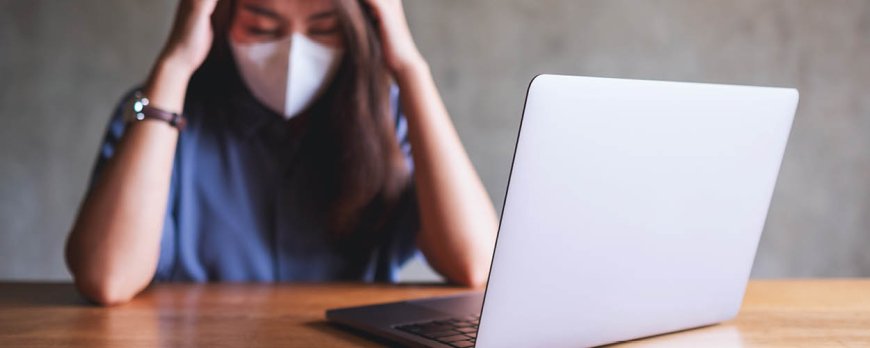Does stress cause pimples?
Explore our definitive guide as we answer, 'Does stress cause pimples?' and dive into the link between your skin health and stress levels.

Does stress cause pimples?
Stress and acne have long been associated, but does stress really cause pimples? Let's explore the connection between stress and your skin.
Key Takeaways:
- Stress does not directly cause acne, but can worsen existing acne by increasing oil production and inflammation.
- Stress hormones released during the body's fight-or-flight response can increase oil production, exacerbating acne.
- Stress-related disruptions in healthy habits, such as lack of sleep and poor diet, can contribute to acne.
- To prevent stress-related acne breakouts, develop stress-relief habits, follow a healthy diet, and seek dermatological treatments if necessary.
- Treatment options for acne include hygiene practices, over-the-counter creams, topical treatments, and prescription medications.
Picking at acne can lead to scarring, so it is crucial to avoid this behavior. While stress reduction alone cannot treat acne, it can be helpful in managing overall stress levels and supporting skin health. By understanding the relationship between stress and pimples, you can take steps to maintain a healthy complexion and improve your overall well-being.

The Link Between Stress and Skin Health
When stress levels rise, it can have a direct impact on your skin health, leading to stress-induced acne. Understanding the connection between stress and your skin is crucial in managing and preventing breakouts.
Stress does not directly cause acne, but it can worsen existing acne by increasing oil production and inflammation. Stress hormones released during the body's fight-or-flight response can trigger the sebaceous glands to produce more oil, clogging pores and leading to breakouts. The increase in oil production also creates an ideal environment for bacteria to thrive, further contributing to acne development.
Additionally, stress-related disruptions in healthy habits can contribute to acne breakouts. Lack of sleep, poor diet, and inadequate skincare routines can all affect your skin's health and make it more prone to breakouts. It is essential to prioritize self-care and adopt stress-relief habits, such as exercise, proper sleep hygiene, and mindfulness techniques.
To manage stress-induced acne, it's important to take a comprehensive approach. Alongside stress management techniques, following a healthy diet that includes plenty of fruits, vegetables, and whole grains can support your skin's health. If necessary, consult a dermatologist who can provide guidance on suitable skincare products and treatments to manage acne effectively.
The role of stress hormones in acne
Emotional stress can wreak havoc on your skin, as it disrupts hormonal balances and triggers various skin issues, including acne. Let's explore how stress hormones contribute to the formation of pimples.
When we experience stress, our body's fight-or-flight response is activated, leading to the release of stress hormones like cortisol. These hormones can have a direct impact on our skin by increasing oil production, clogging pores, and promoting inflammation. The excess oil, combined with the buildup of dead skin cells and bacteria, can lead to the development and worsening of acne.
Stress-induced hormonal imbalances can also affect the production of keratin, a protein found in the skin, hair, and nails. An increase in keratin production can lead to the formation of comedones, commonly known as whiteheads and blackheads. Additionally, stress hormones can stimulate the sebaceous glands to produce more sebum, further contributing to the development of acne.
How stress affects skin health:
- Increases oil production
- Promotes inflammation
- Disrupts keratin production
- Triggers hormonal imbalances
To mitigate the impact of stress on skin health and minimize the occurrence of stress-related acne breakouts, it is crucial to adopt stress-management techniques and prioritize self-care. Finding healthy ways to cope with stress, such as engaging in regular exercise, practicing relaxation techniques, and getting enough sleep, can help regulate stress hormone levels and promote overall skin well-being.
While stress reduction alone cannot completely treat acne, it can play a supportive role in managing overall stress levels, which in turn can have a positive impact on skin health. By adopting a holistic approach that includes stress management, a healthy lifestyle, and appropriate dermatological treatments, individuals can effectively minimize the effects of stress on their skin and maintain a clear and healthy complexion.
Increased Oil Production and Inflammation
When stress takes a toll on your body, it can trigger increased oil production and inflammation in your skin, setting the stage for stress-related breakouts and hormonal acne. Stress hormones released during the body's fight-or-flight response can stimulate the sebaceous glands to produce more oil, leading to clogged pores and the formation of acne.
Furthermore, stress-induced inflammation can exacerbate existing acne and contribute to the development of new breakouts. Inflammatory molecules released in response to stress can worsen redness, swelling, and pain associated with acne lesions.
To combat these effects, it is essential to adopt a comprehensive approach to managing stress-related acne. By incorporating stress-reduction techniques and implementing a skincare routine that targets oil control and inflammation reduction, you can minimize the impact of stress on your skin.
The following strategies can help prevent stress-related breakouts:
- Practice stress management techniques, such as meditation, deep breathing exercises, and regular physical activity.
- Establish a consistent skincare routine that includes gentle cleansing, exfoliation, and the use of non-comedogenic products.
- Avoid picking at acne lesions, as this can lead to scarring and further inflammation.
- Follow a healthy, balanced diet that includes foods rich in antioxidants, vitamins, and minerals to support overall skin health.
- Consider seeking professional help from a dermatologist for severe or persistent acne. They can provide tailored treatment options and guidance to manage your specific skin concerns.
Remember, while stress reduction is important for overall well-being, it alone cannot treat acne. However, by adopting a holistic approach that addresses both stress and skincare, you can effectively manage stress-related breakouts and promote healthier skin.
Disruptions in Healthy Habits
Stress not only affects your body internally but can also disrupt external factors that play a role in acne breakouts. Discover how stress-related disruptions in healthy habits can pave the way for unwanted pimples.
1. Lack of Sleep: When stress levels are high, sleep often takes a backseat. This lack of sleep can lead to an increase in the production of stress hormones, which can trigger inflammation and result in acne breakouts. It is essential to prioritize quality sleep to give your skin the rest it needs to repair and regenerate.
2. Unhealthy Diet: Stress can often lead to unhealthy eating habits, such as reaching for comfort foods high in sugar and processed ingredients. These types of foods have been linked to increased sebum production and inflammation, both of which contribute to acne. To combat stress-related breakouts, focus on consuming a balanced diet rich in fruits, vegetables, and whole grains.
Stress Relief Techniques
3. Healthy coping mechanisms: Finding effective ways to manage stress is key to maintaining healthy skin. Engaging in activities like exercise, meditation, and deep breathing exercises can help reduce stress levels and promote overall well-being. Experiment with different stress relief techniques to find what works best for you.
By addressing these disruptions in healthy habits and incorporating stress reduction techniques into your daily life, you can minimize the impact of stress on your skin. Remember, while stress may not directly cause acne, its effects on oil production, inflammation, and overall well-being can contribute to the development and worsening of breakouts. Take proactive steps towards managing stress and prioritize your skin health for a clearer complexion.

Preventing Stress-Related Acne Breakouts
Managing stress is crucial not only for your overall well-being but also for preventing stress-related breakouts. Explore effective ways to keep your skin clear by reducing stress levels and adopting healthy habits.
1. Stress Management Techniques:
Implement stress management techniques into your daily routine to minimize the negative impact on your skin. Engage in activities that promote relaxation, such as meditation, deep breathing exercises, or yoga. Find what works best for you and make it a regular practice.
2. Follow a Healthy Diet:
Avoid sugary and processed foods that can trigger inflammation in the body and potentially worsen acne. Instead, opt for a balanced diet rich in fruits, vegetables, lean proteins, and whole grains. Drinking plenty of water also helps hydrate the skin and support its natural functions.
3. Skincare and Cleanliness:
Maintain a consistent skincare routine to keep your skin clean and prevent clogged pores. Use gentle, non-comedogenic products that won't further irritate the skin. Be sure to cleanse your face twice a day, moisturize, and properly remove makeup before bed. Avoid touching your face throughout the day to minimize the spread of bacteria.
4. Good Sleep Hygiene:
Adequate sleep is essential for overall health and well-being. Establish a regular sleep schedule and create a relaxing bedtime routine. Avoid electronic devices before bed and create a comfortable sleep environment to ensure quality rest. Getting enough sleep supports your body's natural healing and rejuvenation processes, including skin repair.
5. Seek Dermatological Treatments:
If stress-related breakouts persist or become severe, consider seeking professional help from a dermatologist. They can assess your skin condition and recommend appropriate treatments, such as topical creams, oral medications, or professional skincare procedures. Dermatologists can provide personalized advice and guidance based on your specific needs.
By implementing these strategies, you can effectively manage stress and reduce the likelihood of stress-related breakouts. Remember that while stress reduction alone may not treat acne, it can significantly contribute to your overall well-being and support your skin's health. Take care of yourself both mentally and physically for clear, radiant skin.

Treatment options for acne
Dealing with acne can be challenging, but there are various treatment options available to help manage breakouts. Discover effective strategies, from simple hygiene practices to advanced medical treatments, to control and treat acne.
1. Hygiene practices: Maintaining a consistent skincare routine can help manage acne. Wash your face twice a day with a gentle cleanser and avoid scrubbing harshly, as it can irritate the skin and worsen acne. Use non-comedogenic skincare products that won't clog pores and consider using oil-free makeup.
2. Over-the-counter creams: Over-the-counter creams containing ingredients like benzoyl peroxide or salicylic acid can be effective in reducing acne. These ingredients target bacteria and unclog pores, helping to clear and prevent breakouts. It's important to follow the instructions and be patient, as results may take time.
3. Topical treatments and prescription medications: In more severe cases, a dermatologist may prescribe topical treatments or medications to address acne. These may include retinoids, antibiotics, or hormonal medications, depending on the underlying cause of the acne. It is essential to follow the prescribed regimen and communicate any concerns or side effects with your dermatologist.
4. Avoid picking at acne: Picking at acne can lead to scarring and further inflammation. It is crucial to resist the urge to squeeze or pop pimples, as it can worsen the condition. Instead, focus on gentle, non-invasive treatments and allow the skin to heal naturally.
While stress reduction alone cannot treat acne, it can be helpful in managing overall stress levels. Taking steps to lower stress, such as practicing relaxation techniques, getting regular exercise, and engaging in activities that bring joy, can positively impact both mental well-being and skin health. Remember to consult with a dermatologist to develop a personalized treatment plan that addresses your specific acne concerns.
Importance of avoiding picking at acne
Picking at acne may seem tempting, but it can lead to unwanted consequences, including scarring and prolonged breakouts. It's crucial to avoid this behavior to promote healthy healing and prevent further damage to the skin.
Why picking at acne is harmful
- Picking at acne can introduce bacteria from the hands into the open pimple, increasing the risk of infection and inflammation.
- It can cause the pimple to rupture, spreading the infection to nearby pores and potentially leading to more breakouts.
- Picking can damage the surrounding skin, causing redness, swelling, and long-lasting marks or scars.
- Continual picking can delay the natural healing process, prolonging the time it takes for a pimple to fully disappear.
How to promote healthy healing
Instead of picking at acne, follow these tips to promote healthy healing:
- Keep your hands off: Resist the urge to touch or pick at pimples, as this can introduce bacteria and cause further inflammation.
- Cleanse gently: Wash your face with a mild cleanser twice a day to remove excess oil and dirt without irritating the skin.
- Apply topical treatments: Use over-the-counter spot treatments containing ingredients like salicylic acid or benzoyl peroxide to reduce inflammation and kill acne-causing bacteria.
- Be patient: Allow pimples to heal naturally, and avoid trying to squeeze or pop them. This will reduce the risk of scarring and promote quicker healing.
- Seek professional help: If acne persists or becomes severe, consult a dermatologist who can provide targeted treatments and guidance to manage breakouts effectively.
Remember, picking at acne can worsen the condition and lead to long-term skin damage. By resisting the urge to pick and following proper skincare practices, you can promote healthy healing and prevent unwanted consequences.

Stress reduction and overall well-being
While stress reduction alone cannot treat acne, it plays a significant role in managing overall well-being and the relationship between stress and pimples. Discover the importance of incorporating stress management techniques into your skincare routine.
- Practice relaxation techniques: Engaging in activities such as deep breathing exercises, meditation, and yoga can help reduce stress levels. These techniques promote relaxation and calmness, which can have a positive impact on your skin health.
- Exercise regularly: Physical activity is not only beneficial for your physical health, but it can also help reduce stress. Regular exercise releases endorphins, which are natural mood boosters. Aim for at least 30 minutes of moderate-intensity exercise, such as brisk walking or jogging, every day.
- Get enough sleep: Lack of sleep can contribute to increased stress levels and worsen acne. Prioritize quality sleep by establishing a consistent sleep routine, creating a sleep-friendly environment, and avoiding electronic devices before bedtime.
- Follow a healthy diet: Maintaining a balanced diet is essential for both your overall well-being and skin health. Incorporate plenty of fruits, vegetables, whole grains, and lean proteins into your meals. Avoid excessive sugar and processed foods, as they can contribute to inflammation and breakouts.
- Seek support: Don't hesitate to reach out for support when you're feeling overwhelmed. Talk to friends, family, or a mental health professional about your stressors. Having a support system can make a significant difference in managing stress and promoting overall well-being.
By prioritizing stress management in your daily routine, you can not only improve your overall well-being but also minimize the impact of stress on your skin. Remember, while stress does not directly cause acne, it can certainly worsen existing acne. Take proactive steps to reduce stress and create a healthier environment for your skin to thrive.
Seeking Professional Help for Acne: When and How
If your acne persists or becomes severe, it's essential to seek professional help from a dermatologist. Learn when it's time to consult an expert and explore the potential treatments they can provide.
When dealing with acne, it's important to recognize when self-care measures and over-the-counter treatments are not enough. If your acne is causing significant distress, scarring, or is not responding to simple remedies, it may be time to seek the expertise of a dermatologist. They can assess the severity of your condition and recommend appropriate treatment options.
When to Consult a Dermatologist
- If your acne is severe or persistent, lasting for several months or more
- If your acne is causing emotional distress or affecting your self-confidence
- If your acne is leaving behind scars or dark spots on your skin
- If your acne is not responding to over-the-counter treatments or home remedies
- If your acne is accompanied by other skin conditions or symptoms
By consulting a dermatologist, you can receive an accurate diagnosis and personalized treatment plan tailored to your specific skin type and condition. They may recommend prescription medications, such as topical creams or oral antibiotics, to target the underlying causes of your acne and reduce inflammation. In some cases, dermatologists may also offer procedures like chemical peels or laser therapy to improve acne scars or hyperpigmentation.
Exploring Dermatological Treatments
Dermatologists have access to a wide range of treatment options that can effectively manage acne. These may include:
- Prescription-strength topical medications
- Oral antibiotics or hormonal medications
- Acne extraction or drainage procedures
- Chemical peels or laser therapy for acne scars
It's important to follow your dermatologist's instructions and attend follow-up appointments to monitor the progress of your treatment. They can also provide guidance on skincare routines and lifestyle changes that can help improve your acne and prevent future breakouts.
The role of a healthy lifestyle
Maintaining a healthy lifestyle is essential for optimal skin health, especially in the context of stress and acne. Explore the impact of stress on your skin and discover how a balanced diet, regular exercise, and stress reduction techniques can make a difference.
A balanced diet: What you eat can have a significant impact on your skin. Incorporate foods rich in vitamins, antioxidants, and essential nutrients to promote skin health. Include fruits, vegetables, whole grains, lean proteins, and healthy fats in your diet. Stay hydrated by drinking plenty of water throughout the day.
Regular exercise: Engaging in regular physical activity not only helps manage stress but also promotes healthy blood circulation, which is vital for your skin. Find activities that you enjoy and make exercise a part of your daily routine. Aim for at least 30 minutes of moderate-intensity exercise, such as brisk walking, jogging, or cycling.
Stress reduction techniques: Stress can take a toll on your skin, so it's important to find effective ways to manage stress. Practice relaxation techniques like deep breathing, meditation, or yoga. Find hobbies or activities that help you unwind and reduce stress levels. Prioritize self-care and make time for activities that bring you joy and relaxation.
Summary:
- Maintaining a healthy lifestyle is essential for optimal skin health, especially in the context of stress and acne.
- A balanced diet rich in vitamins, antioxidants, and essential nutrients can promote skin health.
- Regular exercise aids in managing stress and promotes healthy blood circulation.
- Stress reduction techniques, such as deep breathing, meditation, and hobbies, are important for managing stress levels.
By incorporating a balanced diet, regular exercise, and stress reduction techniques into your life, you can support your skin's health and minimize the impact of stress on your skin. Remember, while stress reduction alone cannot treat acne, it plays a vital role in managing overall stress levels and promoting overall well-being.
Conclusion
Stress may not directly cause acne, but its impact on oil production, inflammation, and healthy habits can worsen existing acne. By managing stress levels, adopting a healthy lifestyle, and seeking appropriate treatments, you can minimize stress-related breakouts and support overall skin health.
When we experience stress, our body releases stress hormones as part of the fight-or-flight response. These hormones can stimulate the sebaceous glands, leading to an increase in oil production. Excess oil can clog pores and create an environment for acne-causing bacteria to thrive, resulting in breakouts.
Moreover, stress-related disruptions in healthy habits, such as inadequate sleep and poor diet, can further contribute to the development and worsening of acne. Sleep deprivation can increase inflammation in the body, while a diet high in processed foods and sugar can trigger hormonal imbalances and skin inflammation.
While stress reduction alone cannot treat acne, it plays a significant role in managing overall stress levels and supporting skin health. Incorporating stress-relief habits, such as practicing mindfulness, engaging in regular physical activity, and getting sufficient sleep, can contribute to a healthier complexion. Additionally, seeking appropriate dermatological treatments, such as topical creams or prescription medications, can help address acne concerns effectively.
Remember, picking at acne can lead to scarring and further inflammation, so it is crucial to resist the urge. Instead, focus on a comprehensive approach that includes stress management, a healthy diet, and proper skincare routines. By taking these steps, you can minimize stress-related breakouts and promote a clear, radiant complexion.

FAQ
Does stress cause pimples?
Stress does not directly cause acne, but it can worsen existing acne by increasing oil production and inflammation.
How does stress impact skin health?
Stress can contribute to the development and worsening of acne by triggering hormonal imbalances and increasing oil production and inflammation.
What role do stress hormones play in acne?
Stress hormones released during the body's fight-or-flight response can increase oil production and exacerbate acne breakouts.
How does stress increase oil production and inflammation?
Stress can lead to increased oil production and inflammation, which are key factors in the development of acne. This can result in clogged pores and bacterial growth, worsening breakouts.
Can disruptions in healthy habits contribute to stress-related acne breakouts?
Yes, stress-related disruptions in healthy habits like lack of sleep and poor diet can contribute to acne breakouts. It is important to maintain a healthy lifestyle to support skin health.
How can I prevent stress-related acne breakouts?
To prevent stress-related acne breakouts, it is important to develop stress-relief habits, follow a healthy diet, and seek dermatological treatments if necessary.
What are the treatment options for acne?
Treatment options for acne include hygiene practices, over-the-counter creams, topical treatments, and prescription medications. Seeking professional help is important for severe or persistent acne.
Why is it crucial to avoid picking at acne?
Picking at acne can lead to scarring and further inflammation. It is important to resist the urge to pick at pimples and promote healthy healing.
Can stress reduction alone treat acne?
Stress reduction alone cannot treat acne, but it can be helpful in managing overall stress levels and supporting skin health.
When should I seek professional help for acne?
If you have severe or persistent acne, it is important to seek professional help from a dermatologist who can provide appropriate treatments and guidance.
What is the role of a healthy lifestyle in supporting skin health?
Maintaining a healthy lifestyle, including a balanced diet, regular physical activity, and stress reduction techniques, plays a crucial role in supporting overall skin health.


































































































































